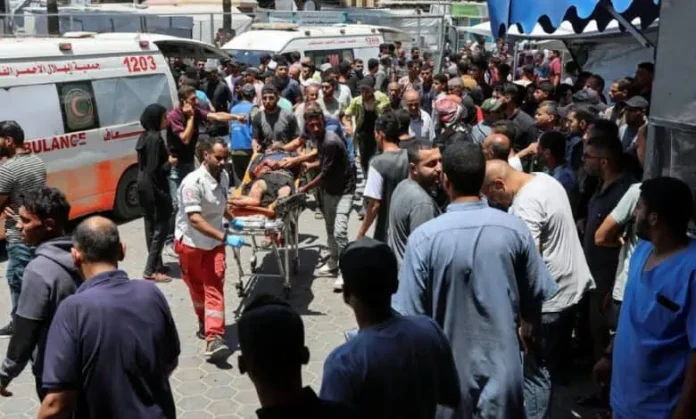Gaza: Amid ongoing Israeli aggression and a full blockade, the United Nations has raised alarm over a dramatic increase in preventable diseases across Gaza. According to the UN Office for the Coordination of Humanitarian Affairs (OCHA), health partners have reported more than 19,000 cases of acute watery diarrhea and over 200 cases each of acute jaundice syndrome and bloody diarrhea in the past two weeks alone, reported the Al Jazeera.
The humanitarian body attributed this crisis to the severe lack of clean water, sanitation, and fuel — all critical for maintaining public health. “These outbreaks are directly linked to the absence of basic services in Gaza, highlighting the urgent need for fuel, medical supplies, and hygiene essentials,” the report emphasized.
In another tragic development, Al Aqsa Hospital witnessed a mass casualty event after an Israeli airstrike in Deir al-Balah. The hospital received over 20 bodies and treated 70 injured civilians, while others had to be shifted to the already burdened Nasser Medical Complex and two other facilities.
“Civilians in Gaza continue to be killed or injured daily — whether through airstrikes, shelling, or while searching for food,” said OCHA. “These tragic events must not be normalized and must come to an immediate end.”
Amid the dire situation, a small glimmer of hope emerged as the World Health Organisation (WHO) successfully delivered its first medical shipment to Gaza since March 2. The delivery included nine trucks loaded with essential medical supplies, 2,000 units of blood, and 1,500 units of plasma through the Kerem Shalom/Karem Abu Salem border.
These were distributed to priority hospitals, with blood and plasma stored at Nasser Medical Complex in Khan Younis. The aid is intended for facilities overwhelmed by a surge in injuries, many of which stem from violence at non-UN, militarized food distribution sites operated by the US.
However, the WHO warned that this delivery was only “a drop in the ocean” compared to the escalating needs.
OCHA further highlighted that of 17 recent humanitarian coordination attempts, six were outright denied by Israeli authorities, including missions to deliver water and repair damaged roads. Though nine others were allowed and two remained unattempted, the obstruction of aid continues to jeopardize critical life-saving operations.
OCHA also expressed deep concern over increasing Israeli settler attacks in the occupied West Bank. One such attack on the village of Kafr Malik, which houses over 3,000 residents, left three Palestinians dead and several injured. The raid was reportedly carried out by hundreds of settlers, some armed and accompanied by Israeli forces. Another group of around 20 settlers set fire to farmlands in Nablus’ Asira al-Qibliya village the same day.
“Civilians continue to bear the brunt of this prolonged Israeli occupation,” the office declared, renewing calls for the protection of civilians, adherence to international law, and unrestricted humanitarian access.




